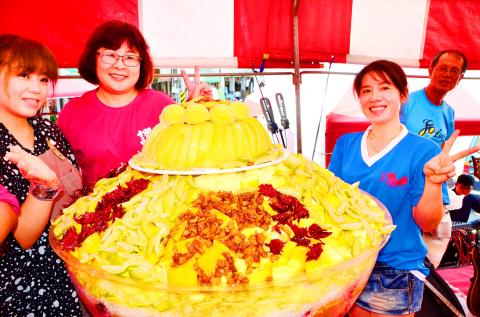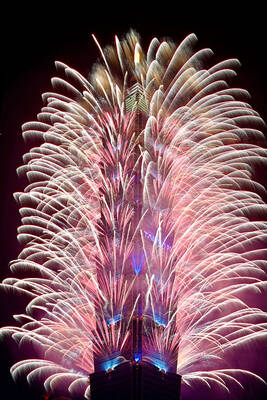Which dessert best represents Taiwan? Instead of pearl milk tea, pineapple cakes or sun cakes, “xuehua ice” has been listed as one of the top 50 desserts in the world, according to an article by pastry chef-turned-food writer Jen Rose Smith on CNN. Xuehua ice (literally “snowflake ice”), a popular local frozen treat, is known as “shaved ice” or “snow ice” in English.
“Taiwanese snow ice is an invitation to get as creative as you’d like,” Smith wrote in her article, titled “50 of the World’s Best Desserts.” First, you need to shave the ice into a pile of crumbling ice flakes. Then, you can blend it with your favorite treats such as red bean paste and fresh fruit such as mangos, strawberries or pineapples, along with syrup, chocolate sauce or sweetened condensed milk.
Other top Asian sweets chosen by the foodie include sesame balls in China, egg tarts in Hong Kong, light cheesecake in Japan, cendol in Singapore, sticky rice with mango and tub tim krob in Thailand, and gulab jamun and kulfi in India.

Photo: Wu Chun-feng, Liberty Times
照片:自由時報記者吳俊鋒
(Eddy Chang, Taipei Times)
什麼是台灣最具代表性的甜點?不是珍珠奶茶,也不是鳳梨酥、太陽餅,而是被CNN列為全球五十大最佳甜點的「雪花冰」!該報導由點心廚師轉行美食作家的史密斯女士所撰寫。雪花冰是本地受歡迎的冰品,英文叫「shaved ice」或「snow ice」。
史密斯在這篇名為《全球五十大最佳甜點》的文章裡寫道:「台灣的雪花冰簡直讓你的創意大爆發。」首先你要把冰刨成一堆細碎的雪花片,然後和你最喜愛的紅豆沙等配料混合在一起,加上芒果、草莓、鳳梨等新鮮水果,最後再淋上糖漿、巧克力醬或煉乳即可。
這位美食家選出的其它亞洲最佳甜點還包括:中國的芝麻球、香港的蛋塔、日本的輕乳酪蛋糕、新加坡的煎蕊(珍多冰)、泰國的芒果糯米飯和椰香石榴冰、印度的玫瑰漿果和牛奶雪糕…等。
(台北時報張聖恩)

A: Wow, US climber Alex Honnold has announced that he’s going to free-climb Taipei 101 on Jan. 24. And the challenge, titled “Skyscraper Live,” will be broadcast worldwide live on Netflix at 9am. B: Oh my goodness, Taipei 101 is the world’s tallest green building. Is he crazy? A: Honnold is actually the climber in the 2019 film “Free Solo” that won an Oscar for best documentary, and was directed by Taiwanese-American Jimmy Chin and his wife. He’s a legendary climber. B: Didn’t Alain Robert, “the French Spiderman,” also attempt to scale Taipei 101 in 2004? A: Yes, but

A: There are always adventurers who want to conquer Taipei 101 as a world-class landmark. Didn’t someone once parachute from the top of it? B: Yeah, that’s right. Austrian extreme sportsman Felix Baumgartner once parachuted from the rooftop observation deck in 2007 without permission. He died earlier last year in a powered paragliding crash at the age of 56. A: Hollywood superstar Tom Cruise also almost jumped off Taipei 101 for “Mission Impossible 3.” B: What? But I didn’t see the building in the movie. A: The news says that the film’s producers applied to the Taipei City

Twelve dinner guests have just left your house, and now a tower of greasy plates stares back at you mockingly. Your hands are already wrinkling as you think about scrubbing each dish by hand. This nightmare bothered households for centuries until inventors in the 19th century tried to solve the problem. The first mechanical dishwashers, created in the 1850s, were wooden machines with hand cranks that splashed water over dishes. Unfortunately, these early devices were unreliable and often damaged delicate items. The real breakthrough came in the 1880s thanks to Josephine Cochrane, a wealthy American socialite. According to her own account,

People use far more than just spoken language to communicate. Apart from using our voices to pronounce words, we also use body language, which includes countless facial expressions. Most people know that smiles and frowns indicate pleasure and displeasure, or that wide eyes with raised eyebrows typically show surprise. However, there is a lot more to learn about how facial expressions can help or hinder communication. People often unintentionally reveal their emotions through very tiny facial movements known as “microexpressions.” The term was popularized by psychologist Paul Ekman, who found that people from cultures across the world generally recognize